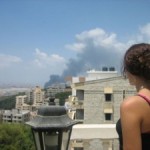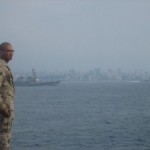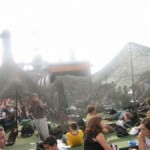by Zaina Budayr
July 29, 2011
When I step off the plane after it lands in Beirut, the past I have experienced comes rushing back in a swirl of sounds, smells and flashes of memory. In the past I had to focus really hard to keep those away from everyday life, because they were that intense and meaningful. Time has definitely helped with healing the wounds. Being Arab-American, the strain of politics has always played a huge role in my life. My father, a survivor of the 1982 Israeli invasion of Beirut and of the Lebanese civil war, told my sister and I shocking stories when we were younger.
Growing up in the U.S. makes it difficult to relate to such an extreme form of politics where people are harmed and broken and loved ones are lost. As children we thought politics was just banter that happened among old people. “Listen to this guy and his crazy tales,” we would say. But in the summer of 2006, I had my own first-hand experience with that world.
Every summer, my family of five (the “traveling tribe” as my mother called it) would go overseas to spend six weeks with my extended family in Beirut. This voyage became such a fun tradition that I would begin planning my summers starting from the summer before. I lived every waking moment waiting on the time when I could see my cousins, friends, family and neighbors.
The summer of 2006 started as normal with the exception of my father not being able to accompany us. He was drowning in work and couldn’t take an extended vacation to the Middle East. Since he wasn’t going, and I always did have such a blast, I decided to take my high school friend, Sarah, who had never been out of the United States. As we landed in Beirut, her eyes were wide and filled with excitement. “Zaina, this is ridiculous,” I remember her saying. I couldn’t help but agree, even after being to Beirut more than twenty times in my life.
Beirut is a city that refuses to sleep, a city always in motion. Her streets are jammed with carts full of fresh fruits, vendors beckoning people to look at their goods. Beirut rests right on the edge of the Mediterranean Sea, the ocean always crashing on her shores, wafting the sea smell into every nook and cranny of her narrow, winding streets. I never felt like I could get enough. Beirut was the place that inspired me and made me feel like I was home.
As my family quickly embraced Sarah as an “adopted Budayr,” she instantly felt the same. At meals they would insist she keep eating, even after she was full. Plates of grape leaves, tabouli, and meat were passed around the table with family members of all ages and sizes grabbing food as the plates zigzagged around. My friends also took a liking to her. We were having the best summer of our lives. I was getting to share a piece of my history and my happy place with someone who had never experienced it before.
On the eve of my 17th birthday a week or so before our scheduled departure my cousin and I were falling asleep in bed. Each summer, my cousin Lynne would tell me “I hope something happens so that you don’t have to leave. The summers go entirely way too fast.” Every year I agreed, every year I hoped and prayed that something would happen, and every year that time would come and go. That night was no different. As we sighed with disappointment, little did we know that events were soon to make our yearly wish come true.
The morning of my birthday, I unexpectedly woke to my mother screaming.
I heard her footsteps quickly stomping closer. Within a matter of seconds the light was snapped on and her distraught face was clear.
“Get out of bed right now! There has been a huge air raid all morning. Go look outside! How did you sleep through that? The airport is lit up with smoke!”
As my cousin and I fumbled our way to the balcony we couldn’t believe our eyes. The airport was indeed smoking with bombed gasoline tanks spewing a thick, black fog up into the sky.
Within a couple of hours, the entire sky went from being the beautiful clear Mediterranean blue to a grey blanket of gloom. Even the weather started to turn somber.
We realized that our week of fun was no longer taking place, so we tried to make do. We were stuck in our apartment complex. My birthday was ruined. Luckily, most of my friends and family lived in the same complex. Our wish had come true. We couldn’t leave. All we could do was wait. But with time the waiting became suffocating.
The television news made it worse as the country’s panic became more apparent. The previous day, the Lebanese group Hezbollah had captured two Israeli soldiers to use as bargaining tokens for the release of the many Palestinian and Lebanese prisoners that Israel held captive. Israel’s anger over these captured soldiers had turned into a heated match. Clearly, we were being overpowered. Nobody knew what would happen next. All we could do was wait.
After four or five days, the excitement of being trapped had worn off. We all had cabin fever, and the Israelis were continuing their bombings. They were now targeting bridges, so all traffic was being stopped and travel by car was being discouraged. Trapped in the house, we had nothing to do but watch television. Each report brought nothing but bad news; each development meant more confinement in our houses.
Then the situation escalated. The Israelis claimed they knew there were terrorists functioning in Dahee, a town on the outskirts of Beirut. Within a couple of hours they had started to barrage the city with high intensity bombs; rumors of poison gas were quickly spreading. I had a hard time understanding their reasoning for this cruel and explosive method of getting what they wanted, for just days before I had been in that town and didn’t notice any people who looked like “terrorists.”
With each bomb, our windowpanes shook and our building trembled. My family and I would line up in the corridor next to our bathroom. One of my closest friends, Adonis, had been sitting with us moments before the bombardment. When he realized his town was being bombed and that he had left his family at home, his face turned pale. Within seconds, before we could stop him, Adonis bolted out of the door. “Ado!” I screamed, “Come back! Its so dangerous!”
He didn’t even look back for a second. In true Arab mentality, family comes first. His life didn’t matter. The act of getting back to his mother, father, and brother were more important. In that instant I had no idea if my childhood friend would be okay, nor did I know if we were going to be okay. All I knew was that I was in a dreamlike state. I took a look around me. All twenty of us were pushed together; everyone was crying, and guilt washed over me as I realized Sarah was here.
The Lebanese are notorious for waltzing with death and still trying to find one last minute to have a good time. It is like a desensitization of sorts. Sarah, on the other hand, was new to this culture and came from a place where safety was always available. It was because of my actions that Sarah was now in this situation with us. I had put her in a real-life game of chance.
As these thoughts flooded my mind, I looked up to see my cousin Lynne staring at me. As we stared at each other for a moment, looked around us, and then looked back at each other, we began to laugh. Not only did we start to laugh, but we became hysterical. In our own moment of insanity, we clearly understood each other. This moment was surreal, and in its terrifying nature, Lynne and I only saw a funny sight coming from a movie that we shouldn’t be in. We had stepped back so far from reality and were so close to what we felt was the end that our understanding of each other made us laugh.
People always say that courage is in physical ability or might, that courage is when you step in the face of danger and scoff at it. However, for me, courage was finding humor in severity, finding light in the dark, and finding the positive in the negative. Realizing that I had the capability to make a terrible situation into something more positive is something I find is one of the best life lessons I have learned. From that one laugh, we took our own “held-as-captive lives” into our own hands.
Clearly we survived. And Adonis and his family got through okay as well.
The next morning, all the people from the next-over neighborhood had run to our area to escape the atrocities of the night before. Cars, families, and children of all ages jammed the streets. People were sleeping on dirt, women carried all of their belongings, and people were wailing. We couldn’t open the gates to our apartment complex because everyone was so hungry that they were storming doors. Everyone was afraid, and we were literally locked into our house.
Finally, relief came. After waiting day after day for news of some sort of evacuation route, we heard rumblings that the U.S. had finally decided to evacuate us. I was getting frustrated at this point. Not only had countries like Sri Lanka and Brazil already evacuated their citizens, but the U.S. hadn’t even mentioned coming to help us. I was shocked that a country I had been raised in didn’t find this invasion severe enough to aid its own citizens. I felt betrayed and my anger was simmering. But finally we were told to meet at the seaport the next morning to board evacuation vessels.
Normally getting to that port was about a 45-minute drive, but since the Israelis were bombing bridges and streets, now we had to go a back way through the mountains and around to the other side on winding dirt roads. Taxi drivers were charging triple their normal rates, due to the risk associated with these drives. That night we drove down to my grandfather’s house in Beirut. It was a ride that lasted for what felt like years. I could tell my mother was tense because she was silent for the entire trip. Spending the night in my grandfather’s house knowing that we were soon going to be leaving my beloved Beirut was bitter. I didn’t feel good about it and my sleep was restless. I was dreading morning.
With the sun just barely rising, we packed our bags and jumped back into the taxi. When we arrived at the port, thousands and thousands of people were standing there in a jumbled frenzy. Guards with megaphones were yelling directions, the people were screaming back at them. Everyone was afraid and everyone wanted out.
We waited all day, baking underneath the now cruel sun. After hours of waiting, the guards told us to go home. Everything was disorganized and no one was being allowed through. Before we left they handed us a number and told us that maybe it would help in the morning. The pit in my stomach continued to grow. As we worked our way back to my grandfather’s house, all was quiet. The once boisterous streets of Beirut were now silent. My family was quiet as well as we waited for the next morning.
That next day Sarah, my mother, brother, sister and I shuffled back to the port with our suitcases and bags. The sight we met was disheartening. Thousands of people were waiting, the scorching sun was still there, and people were tense. Thankfully, since we had waited the day before and received a number, we only had to wait a couple of hours before we made some sort of progress.
After working through the lines, being processed, and making it past the Lebanese army, we finally reached the point where the U.S. Marines took charge and got us onto the rescue vessels. I was overjoyed to be greeted with a “hey, little lady, want me to take your bag for you?”
Then I finally saw it; the USS Nashville. The Marines were carrying old women on board, and we were soon packed on the ship like sardines. As we sat there, Mom started talking with the man to her left. It was chef and author Anthony Bourdain, who had been filming an episode in Beirut when the war broke out. If you go to YouTube and punch in Anthony Bourdain Beirut 2006, you can watch the entire saga from his point of view.
As our ship sailed off and I saw my city of Beirut grow smaller and smaller in the distance, I oddly didn’t feel a wave of relief. I felt guilty leaving. I didn’t want safety or to see my friends back in the U.S.
I didn’t want a Big Mac or a tub of Ben and Jerry’s ice cream because I felt like it was my duty to stay in solidarity with my people. This is the place where my friends and family were. The pit in my stomach continued to grow. I tried not to think about my feeling of guilt.
As for Sarah, after the initial fears, she was starting to feel better at the prospect of getting home. “When we got to Cyprus I felt some amount of relief,” she says now. But, she adds, “I couldn’t stop thinking about the conflict in Lebanon and how it was tearing apart this gorgeous country I had recently fallen in love with. I was worried about my new friends and [your] family.
And the experience was enlightening, she adds. “The trip to Lebanon deeply molded my worldview, and particularly affected the way I feel about international policy. It helped open my mind in so many ways, exposing me to a rich culture and forever branding my mind with powerful memories and images.”
On board the ship that night and through the next morning we tried to forget the tragic situation we had just left, playing card game after card game with the Marines. We laughed and had fun in the midst of chaos. Even though I was leaving my country, the Lebanese mentality of enjoying life through the most tragic of times is something I’ll always have.
Life is a funny thing.
One can never know what the fates will decide and where the pieces will fall. What I believe is that life experiences happen for a reason. Life is supposed to be unexpected, and in an odd sort of way, these experiences build character and strength in the ones who survive them.
Beirut is a part of my life and always will be. Going through such a stressful ordeal with the people I loved most is one my family, friends and I still talk about. The situation challenged my judgment, tested my courage, and opened my eyes to a harsh reality that many people live through every single day. From that experience on, I have tried to live my life in a way that enlightens people about overseas policies, what the experience was like, and how I benefited from it.



